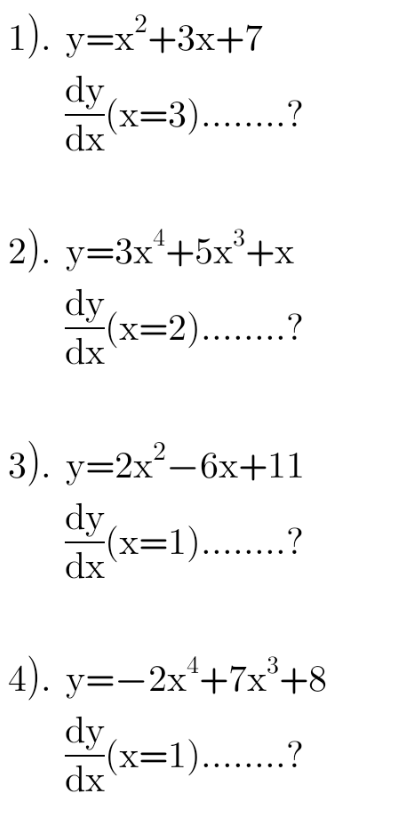Question Number 158060 by zainaltanjung last updated on 30/Oct/21

Answered by puissant last updated on 30/Oct/21

$$\left.\mathrm{1}\right) \\ $$$$\frac{{dy}}{{dx}}\:=\:\mathrm{2}{x}+\mathrm{3}\:;\:{x}=\mathrm{3}\:\Rightarrow\:\frac{{dy}}{{dx}}=\:\mathrm{9} \\ $$$$\left.\mathrm{2}\right) \\ $$$$\frac{{dy}}{{dx}}=\:\mathrm{12}{x}^{\mathrm{3}} +\mathrm{15}{x}^{\mathrm{2}} +\mathrm{1}\:;\:{x}=\mathrm{2}\:\Rightarrow\:\frac{{dy}}{{dx}}=\mathrm{157} \\ $$$$\left.\mathrm{3}\right) \\ $$$$\frac{{dy}}{{dx}}\:=\:\mathrm{4}{x}−\mathrm{6}\:;\:{x}=\mathrm{1}\:\Rightarrow\:\frac{{dy}}{{dx}}=−\mathrm{2} \\ $$$$\left.\mathrm{4}\right) \\ $$$$\frac{{dy}}{{dx}}\:=\:−\mathrm{8}{x}^{\mathrm{3}} +\mathrm{21}{x}^{\mathrm{2}} \:;\:{x}=\mathrm{1}\:\Rightarrow\:\frac{{dy}}{{dx}}=\:\mathrm{13} \\ $$
